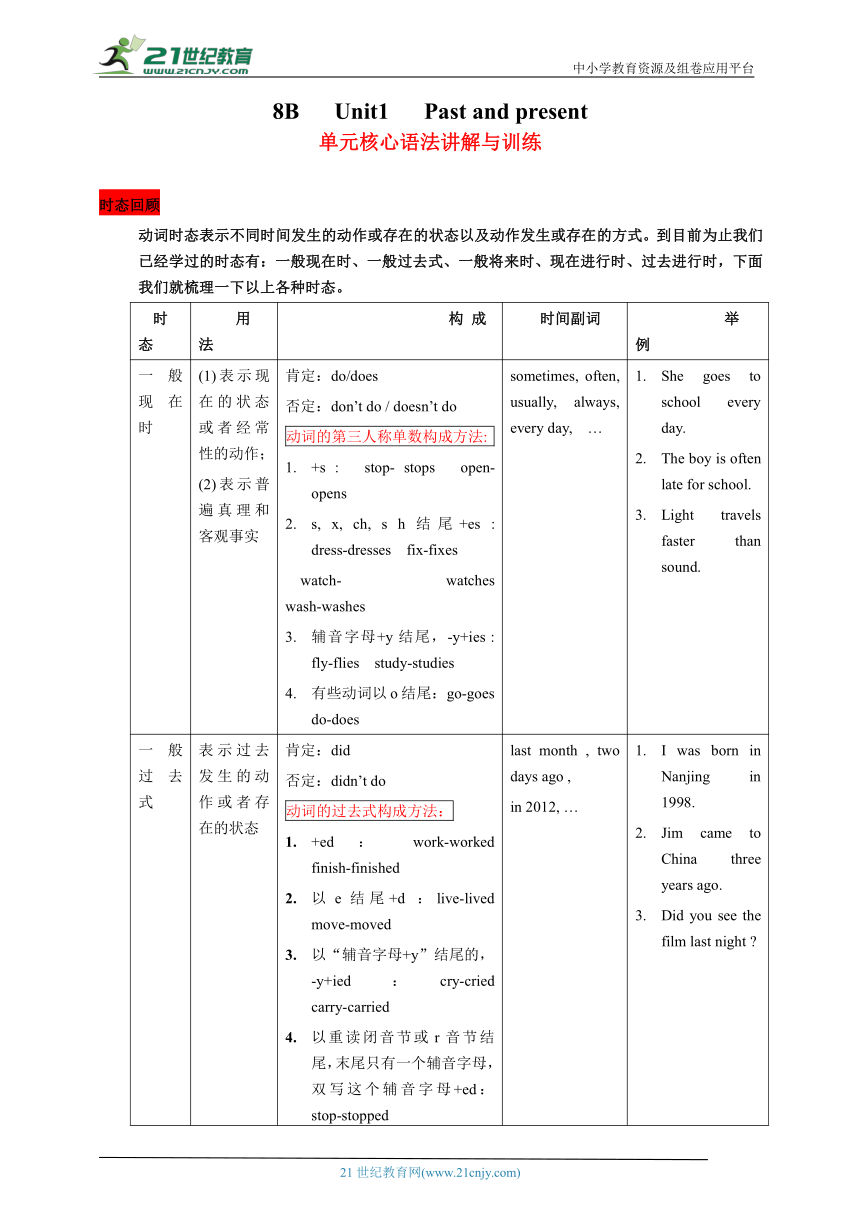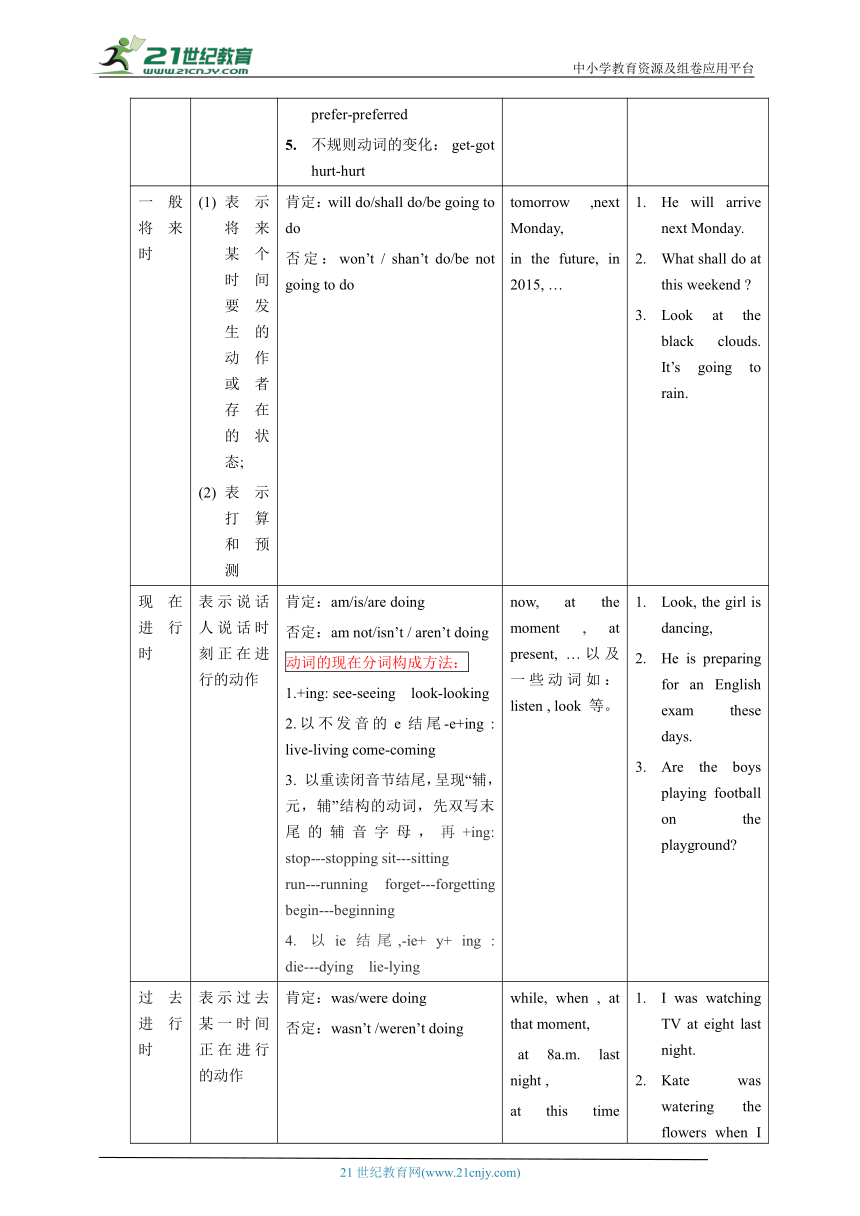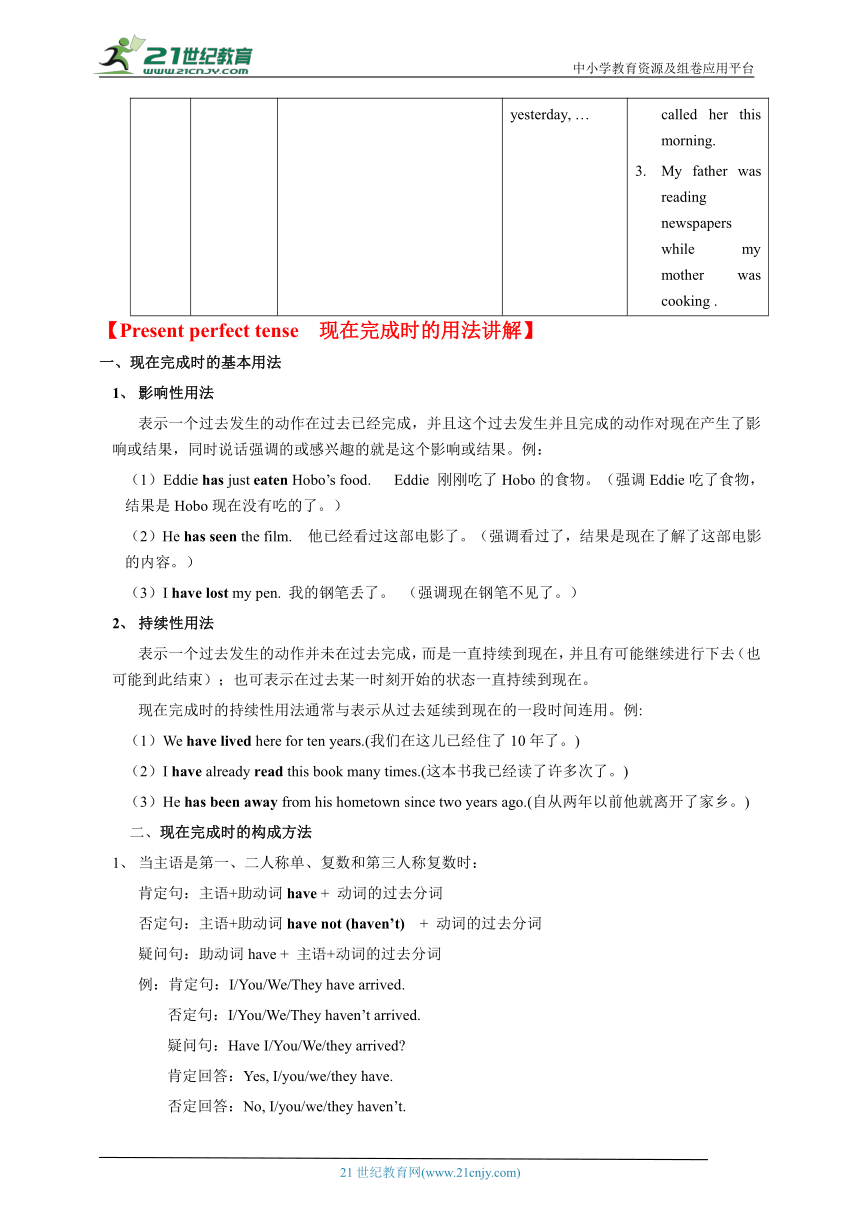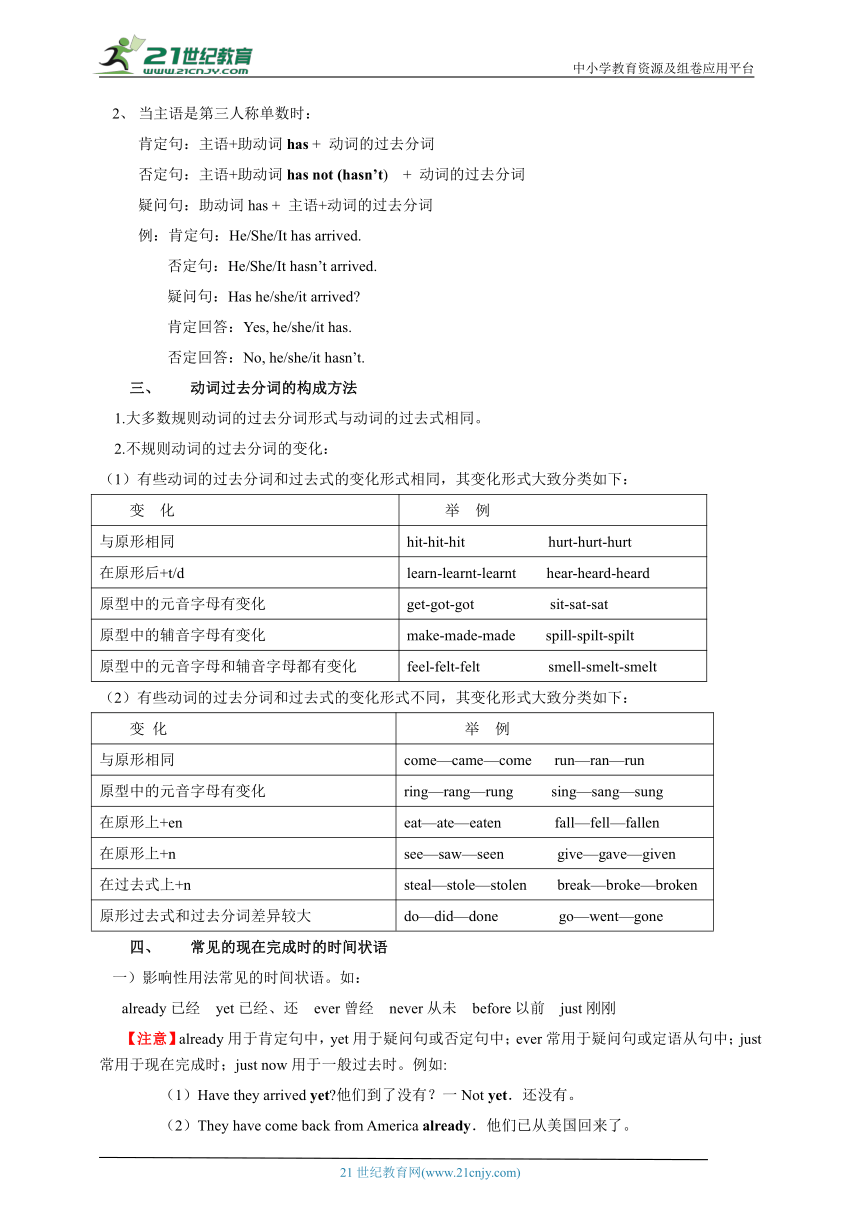Unit 1 Past and Present 单元核心语法讲解和知识点梳理
文档属性
| 名称 | Unit 1 Past and Present 单元核心语法讲解和知识点梳理 |  | |
| 格式 | zip | ||
| 文件大小 | 219.0KB | ||
| 资源类型 | 试卷 | ||
| 版本资源 | 牛津译林版 | ||
| 科目 | 英语 | ||
| 更新时间 | 2023-02-04 08:17:09 | ||
图片预览




文档简介
中小学教育资源及组卷应用平台
8B Unit1 Past and present
单元核心语法讲解与训练
时态回顾
动词时态表示不同时间发生的动作或存在的状态以及动作发生或存在的方式。到目前为止我们已经学过的时态有:一般现在时、一般过去式、一般将来时、现在进行时、过去进行时,下面我们就梳理一下以上各种时态。
时 态 用 法 构 成 时间副词 举 例
一般现在时 (1)表示现在的状态或者经常性的动作;(2)表示普遍真理和客观事实 肯定:do/does否定:don’t do / doesn’t do 动词的第三人称单数构成方法: +s : stop- stops open- opens s, x, ch, s h结尾+es : dress-dresses fix-fixes watch- watches wash-washes辅音字母+y结尾,-y+ies : fly-flies study-studies有些动词以o结尾: go-goes do-does sometimes, often, usually, always, every day, … She goes to school every day.The boy is often late for school.Light travels faster than sound.
一般过去式 表示过去发生的动作或者存在的状态 肯定:did否定:didn’t do 动词的过去式构成方法:+ed : work-worked finish-finished以e结尾+d :live-lived move-moved以“辅音字母+y”结尾的,-y+ied :cry-cried carry-carried以重读闭音节或r音节结尾,末尾只有一个辅音字母,双写这个辅音字母+ed:stop-stopped prefer-preferred不规则动词的变化: get-got hurt-hurt last month , two days ago ,in 2012, … I was born in Nanjing in 1998.Jim came to China three years ago.Did you see the film last night
一般将来时 表示将来某个时间要发生的动作或者存在的状态;表示打算和预测 肯定:will do/shall do/be going to do 否定:won’t / shan’t do/be not going to do tomorrow ,next Monday,in the future, in 2015, … He will arrive next Monday.What shall do at this weekend Look at the black clouds. It’s going to rain.
现在进行时 表示说话人说话时刻正在进行的动作 肯定:am/is/are doing否定:am not/isn’t / aren’t doing动词的现在分词构成方法:1.+ing: see-seeing look-looking2.以不发音的e结尾-e+ing : live-living come-coming3. 以重读闭音节 ( http: / / zhidao. / search word=%E9%87%8D%E8%AF%BB%E9%97%AD%E9%9F%B3%E8%8A%82&fr=qb_search_exp&ie=utf8" \t "_blank )结尾,呈现“辅,元,辅”结构的动词,先双写末尾的辅音字母 ( http: / / zhidao. / search word=%E8%BE%85%E9%9F%B3%E5%AD%97%E6%AF%8D&fr=qb_search_exp&ie=utf8" \t "_blank ),再+ing: stop---stopping sit---sitting
run---running forget---forgetting begin---beginning4. 以ie结尾,-ie+ y+ ing : die---dying lie-lying now, at the moment , at present, …以及一些动词如:listen , look 等。 Look, the girl is dancing,He is preparing for an English exam these days.Are the boys playing football on the playground
过去进行时 表示过去某一时间正在进行的动作 肯定:was/were doing否定:wasn’t /weren’t doing while, when , at that moment, at 8a.m. last night ,at this time yesterday, … I was watching TV at eight last night.Kate was watering the flowers when I called her this morning.My father was reading newspapers while my mother was cooking .
【Present perfect tense 现在完成时的用法讲解】
一、现在完成时的基本用法
1、 影响性用法
表示一个过去发生的动作在过去已经完成,并且这个过去发生并且完成的动作对现在产生了影响或结果,同时说话强调的或感兴趣的就是这个影响或结果。例:
(1)Eddie has just eaten Hobo’s food. Eddie 刚刚吃了Hobo的食物。(强调Eddie吃了食物,结果是Hobo现在没有吃的了。)
(2)He has seen the film. 他已经看过这部电影了。(强调看过了,结果是现在了解了这部电影的内容。)
(3)I have lost my pen. 我的钢笔丢了。 (强调现在钢笔不见了。)
2、 持续性用法
表示一个过去发生的动作并未在过去完成,而是一直持续到现在,并且有可能继续进行下去(也可能到此结束);也可表示在过去某一时刻开始的状态一直持续到现在。
现在完成时的持续性用法通常与表示从过去延续到现在的一段时间连用。例:
(1)We have lived here for ten years.(我们在这儿已经住了10年了。)
(2)I have already read this book many times.(这本书我已经读了许多次了。)
(3)He has been away from his hometown since two years ago.(自从两年以前他就离开了家乡。)
2、 现在完成时的构成方法
1、 当主语是第一、二人称单、复数和第三人称复数时:
肯定句:主语+助动词have + 动词的过去分词
否定句:主语+助动词have not (haven’t) + 动词的过去分词
疑问句:助动词have + 主语+动词的过去分词
例:肯定句:I/You/We/They have arrived.
否定句:I/You/We/They haven’t arrived.
疑问句:Have I/You/We/they arrived
肯定回答:Yes, I/you/we/they have.
否定回答:No, I/you/we/they haven’t.
2、 当主语是第三人称单数时:
肯定句:主语+助动词has + 动词的过去分词
否定句:主语+助动词has not (hasn’t) + 动词的过去分词
疑问句:助动词has + 主语+动词的过去分词
例:肯定句:He/She/It has arrived.
否定句:He/She/It hasn’t arrived.
疑问句:Has he/she/it arrived
肯定回答:Yes, he/she/it has.
否定回答:No, he/she/it hasn’t.
3、 动词过去分词的构成方法
1.大多数规则动词的过去分词形式与动词的过去式相同。
2.不规则动词的过去分词的变化:
(1)有些动词的过去分词和过去式的变化形式相同,其变化形式大致分类如下:
变 化 举 例
与原形相同 hit-hit-hit hurt-hurt-hurt
在原形后+t/d learn-learnt-learnt hear-heard-heard
原型中的元音字母有变化 get-got-got sit-sat-sat
原型中的辅音字母有变化 make-made-made spill-spilt-spilt
原型中的元音字母和辅音字母都有变化 feel-felt-felt smell-smelt-smelt
(2)有些动词的过去分词和过去式的变化形式不同,其变化形式大致分类如下:
变 化 举 例
与原形相同 come—came—come run—ran—run
原型中的元音字母有变化 ring—rang—rung sing—sang—sung
在原形上+en eat—ate—eaten fall—fell—fallen
在原形上+n see—saw—seen give—gave—given
在过去式上+n steal—stole—stolen break—broke—broken
原形过去式和过去分词差异较大 do—did—done go—went—gone
4、 常见的现在完成时的时间状语
一)影响性用法常见的时间状语。如:
already已经 yet已经、还 ever曾经 never从未 before以前 just刚刚
【注意】already用于肯定句中,yet用于疑问句或否定句中;ever常用于疑问句或定语从句中;just常用于现在完成时;just now用于一般过去时。例如:
(1)Have they arrived yet 他们到了没有?一Not yet.还没有。
(2)They have come back from America already.他们已从美国回来了。
(3)He has just fallen asleep.他刚刚睡着。
(4)The girl left just now.这个女孩刚刚离开。
2) 持续性用法常见的时间状语。 例:
recently最近 since自从 for+时间段 so far到目前为止
in the past /last+时间段 all one's life一辈子 ever since从那以后
【注意】for后面跟一段时间,since后跟一时间点。(since后面跟一个过去式的时间或者是一个过去时的句子)例:
(1)His father has been ill for a week / since a week ago.
他的父亲已经病了一个星期了。
(2)Jim has learned 2,000 English words since he came into this school.
Jim自从进入这所学校以来已经学了2,000个英语单词了。
5、 使用现在完成时需注意的问题
1、 瞬间性动词在持续性用法中的转换
瞬间性动词不能表示持续性状态,所以在持续性用法中要转换成相应的持续性动作或状态。
例词 转换为 例词 转换为
join参加 be in + 组织/ be a member of + 组织 become变得 be
die 死 be dead leave离开 be away (from)
buy买 have borrow借 keep
arrive到达 be in/ be at get to know了解 know
come 来 be here go去 be there
get up起床 be up come back/ return 回来 be back
fall asleep入睡 be asleep begin/start 开始 be on
finish结束 be over get married结婚 be married
2、 持续性用法的多种表达:
一句多译:他离开他的家乡已经两年了。
1)He has been away from his hometown for two years.
2) He has been away from his hometown since two years ago.
3) It has been two years
4) It is two years since he left his hometown.
5)Two years has passed
知识链接:
现在完成时与一般过去时的区别:
1、 现在完成时表示过去发生的动作或存在的状况,但和现在有联系,强调的是对现在造成的影响或结果,它不能同表示过去的时间状语连用,汉译英时可加“已经”等词。简言之,利用过去,说明现在。例如:
I have already read the novel written by the world-famous writer.我已经读过了由世界著名作家写的小说。(已经看过,且了解这本书的内容)
2、 一般过去时只表示过去发生的动作或状态,和现在无关,它可和表示过去的时间状语连用,汉译英时可加“过”、“了”等词。简言之,仅谈过去,不关现在。例如:
I read the novel last month.我上个月看了这本小说。(只说明上个月看了,不涉及现在是否记住)
单元知识点归纳与总结
welcome to the unit
重点短语:
1.过去和现在 past and present (在过去: in the past ; 现在,目前: at present)
2.过去常与我分享食物used to share food with me
3.过去对我很好used to be so kind to me
4.打牌和下中国象棋 play cards and Chinese chess
重点句型:
1.You’ve changed ,Eddie. You used to share food with me!你已经变了,Eddie. 你过去常常与我分享食物。
2.You’ve changed too. You used to be so kind to me. 你也变了, 你过去对我那么好。
3.We used to play cards and Chinese chess in the park.我们过去常常在公园里打牌和下中国象棋。
used to do sth : 过去常常做某事。例:I used to go to school by bike.我过去经常骑自行车去上学 ;
used to be + 形容词/名词:过去常常是…;例:It used to be a school.这儿过去是一所学校。
be used to doing sth:习惯做某事 例:Tom is used to getting up early. Tom习惯于早起。
4.There were always too many people on the bus, and it took along time to wait for the next one.公共汽车上总是有许多人,要花费很长时间等候下一班车。
It takes (sb) some time to do sth: 花费时间做某事
例:It takes me half an hour to dance every day.= I spend half an hour dancing every day.我每天花费半个小时的时间来跳舞。
Reading
重点短语:
1.很熟悉,了解某物或某人 know sth /sb well =know sth /sb a lot
2. 住在小镇的北部 live in the northern part of the town
3. 结婚 get married / be married
4. 搬到两个街区以外的另外一所公寓 move to another flat two blocks away
5. 变化很大 change a lot
6. 在镇中心 in the town centre = in the centre of the town
7.把……变成…… turn sth into sth
(关于turn的词组:打开/关闭: turn on /off ;
把声音调大/关小 :turn up/ turn down ;
转身:turn around )
8. 钢铁厂 a steel factory / steel factories
9. 把垃圾扔进河里 put the waste into the river
(关于put的词组:穿上衣服、裤子等:put on ;
放好,收起来:put away;
扑灭: put out;
记下,放下:put down;
举起,粘连:put up;
延期,拖延:put off)
10.采取措施来改善这种状况take action to improve the situation
11.更加干净 be much cleaner
12.在某些方面 in some ways
13.搬走 move away
14.像以前一样常常as often as before
15.觉得有点孤独feel a bit lonely
16.有时from time to time=at times=sometimes
17.看见令人惊讶的改变 see the amazing changes
18.发生 take place
重点句型:
1.Do you know Sunshine Town very well , Mr Chen 你很了解Sunshine Town吗,Mr Chen?
2.When I got married in 1965, my wife and I moved to another flat two blocks away and we’ve lived here since then.当我1965年结婚时,我和妻子搬到两个街区以外的另外一所公寓,此后一直住在这儿。(get married=be married 例:How long have you been married 你结婚多长时间了?)
3.Has the area changed a lot over the years 这个地方在这些年当中变化大吗?(a lot 用来修饰动词change ; a lot of =lots of,用来修饰名词; change 也可以做名词。例:My hometown has changed a lot.=There have been great changes in my hometown.我的家乡已经发生了很大的变化)
4.Now the government has turned part of the town centre into a new park.现在政府已经把镇中心的一部分改造成了一个新的公园。(turn sth into sth :把……变成……)
5.There was once a steel factory near the Sunshine River.在Sunshine River附近曾经有座钢铁厂(once:曾经,一次 例:How often do you go shopping Once a week. 你多久去购物一次?一周一次。 )
6.Later the government realized the problem and took action to improve the situation.不久政府意识到了这个问题,采取措施来改善这种状况。(take action to do sth.: 采取措施做某事)
8.The new shopping mall is a good place to have fun. 购物中心是玩乐的好地方。(动词不定式“to have fun”做定语修饰名词词组“a good place”。 例:The bookshop is a good place to read all kinds of books. 书店是阅读各种书籍的好地方。 )
9.Anyway, it’s good to see the amazing changes in the town.无论如何,能看到小镇这些令人惊讶的变化还是不错的。(在it is + adjective + to-infinitive 结构表示做某事是怎样的,it为形式主语,无实际意义,真正的主语是后面的动词不定式。例:It’s meaningful to help others in need. 帮助有需要的人是很有意义的。 )
10.It has become impossible for us to see each other as often as before. 对于我们而言像以往一样彼此经常见面已经变得不可能了。
(= To see each other as often as before has become impossible for us. “It is + adjective +for sb to-infinitive”结构表示“对于某人而言做某事是怎样的”。 例:It’s important for us to speak English a lot. 对于我们而言多说英语是很重要的。)
12.Now I feel a bit lonely from time to time.现在我时不时会觉得有点孤独。(lonely:形容词,孤独的,寂寞的,偏僻的; alone :形容词/副词,独自地,单独地 例:The old man lives in a lonely place alone/on his own, but he never feels lonely. 虽然这位老人独自生活在一个偏僻的地方,但是他一点都不感觉孤独。)
Integrated skills & Study skills
重点短语:
1. 搬进新家 move into new house
2.我的一位老朋友 one of my old friends
3.从美国回来 return from the USA
4.出国 go abroad
5. 与某人保持联系 keep/ stay in touch with sb
6. 主要通过email交流 mainly communicate by email (communicate的名词:communication )
7. 容易得多 be much easier
8.小学 primary school
重点句型:
1.She’s just returned from the USA.她刚从美国回来。(she’s是she has的缩略形式。return表示“回来,返回”的意思时,用作不及物动词。例:return home (adv.)回家 ;return to school (n.)回到学校)
2.When did you last seen each other 你们上一次见面是什么时候 (这里last 是副词,意思是“最近,上一次”,可以位于动词前,也可以位于动词后。例:I last saw him in Shanghai two years ago.= I saw him last in Shanghai two years ago.我上一次是两年前在上海看见他的。)
3.She went abroad with her parents in 2008。她和她的父母2008年出国了。(go abroad : 出国)
4.So how do you keep in touch with each other 那你们是如何保持联系的呢?(keep in touch with sb :与某人保持联系)
5.The Internet makes communication much easier.网络使得交流容易得多。(much修饰比较级)
6.When I was in primary school, I walked to school with my mum. 当我上小学的时候,我和我的妈妈步行到学校。(walk to school= go to school on foot)
7.Now I go to school by bus on my own. 现在我自己坐车去上学。(go to school by bus= take the bus to school; on my own= by myself=alone : 独自一个人)
8.Chatting with old friends on the Internet is fun. 和老朋友网上聊天很有趣。(动名词“chatting with old friends” 在句子中做主语。)
Task
重点短语:
1.享受富裕舒适的生活 enjoy a rich and comfortable life
2.采访某人 have an interview(s) with sb / interview sb (interview可做名词和动词)
3.一生 all one’s life
4.开阔地 open spaces
5.新鲜的空气 fresh air
6.变得更好get better
7.中国的首都the capital of China
8.玩乐的好地方a good place to have fun
9.靠某人自己on one’s own=by oneself=alone
10.又窄又脏的道路narrow an dirty roads
重点句型:
1.I spend more time on my homework than before. 我比以前花费更多的时间来写家庭作业。
(spend some time on sth / spend some time doing sth: 花时间做某事 = I spend more time doing my homework.
近义句型是: It takes (sb)some time to do sth : It takes me more time to do my homework.)
2.Mr Chen thinks life is getting better now. Mr Chen认为生活现在变得更好了。(think 后面带了一个省略that的宾语从句;be getting better意思是“正变得更好))
3.Amazing changes have taken place in Sunshine Town.令人惊讶的变化已经发生在了Sunshine Town。(take place=happen )
21世纪教育网 www.21cnjy.com 精品试卷·第 2 页 (共 2 页)
HYPERLINK "http://21世纪教育网(www.21cnjy.com)
" 21世纪教育网(www.21cnjy.com)
8B Unit1 Past and present
单元核心语法讲解与训练
时态回顾
动词时态表示不同时间发生的动作或存在的状态以及动作发生或存在的方式。到目前为止我们已经学过的时态有:一般现在时、一般过去式、一般将来时、现在进行时、过去进行时,下面我们就梳理一下以上各种时态。
时 态 用 法 构 成 时间副词 举 例
一般现在时 (1)表示现在的状态或者经常性的动作;(2)表示普遍真理和客观事实 肯定:do/does否定:don’t do / doesn’t do 动词的第三人称单数构成方法: +s : stop- stops open- opens s, x, ch, s h结尾+es : dress-dresses fix-fixes watch- watches wash-washes辅音字母+y结尾,-y+ies : fly-flies study-studies有些动词以o结尾: go-goes do-does sometimes, often, usually, always, every day, … She goes to school every day.The boy is often late for school.Light travels faster than sound.
一般过去式 表示过去发生的动作或者存在的状态 肯定:did否定:didn’t do 动词的过去式构成方法:+ed : work-worked finish-finished以e结尾+d :live-lived move-moved以“辅音字母+y”结尾的,-y+ied :cry-cried carry-carried以重读闭音节或r音节结尾,末尾只有一个辅音字母,双写这个辅音字母+ed:stop-stopped prefer-preferred不规则动词的变化: get-got hurt-hurt last month , two days ago ,in 2012, … I was born in Nanjing in 1998.Jim came to China three years ago.Did you see the film last night
一般将来时 表示将来某个时间要发生的动作或者存在的状态;表示打算和预测 肯定:will do/shall do/be going to do 否定:won’t / shan’t do/be not going to do tomorrow ,next Monday,in the future, in 2015, … He will arrive next Monday.What shall do at this weekend Look at the black clouds. It’s going to rain.
现在进行时 表示说话人说话时刻正在进行的动作 肯定:am/is/are doing否定:am not/isn’t / aren’t doing动词的现在分词构成方法:1.+ing: see-seeing look-looking2.以不发音的e结尾-e+ing : live-living come-coming3. 以重读闭音节 ( http: / / zhidao. / search word=%E9%87%8D%E8%AF%BB%E9%97%AD%E9%9F%B3%E8%8A%82&fr=qb_search_exp&ie=utf8" \t "_blank )结尾,呈现“辅,元,辅”结构的动词,先双写末尾的辅音字母 ( http: / / zhidao. / search word=%E8%BE%85%E9%9F%B3%E5%AD%97%E6%AF%8D&fr=qb_search_exp&ie=utf8" \t "_blank ),再+ing: stop---stopping sit---sitting
run---running forget---forgetting begin---beginning4. 以ie结尾,-ie+ y+ ing : die---dying lie-lying now, at the moment , at present, …以及一些动词如:listen , look 等。 Look, the girl is dancing,He is preparing for an English exam these days.Are the boys playing football on the playground
过去进行时 表示过去某一时间正在进行的动作 肯定:was/were doing否定:wasn’t /weren’t doing while, when , at that moment, at 8a.m. last night ,at this time yesterday, … I was watching TV at eight last night.Kate was watering the flowers when I called her this morning.My father was reading newspapers while my mother was cooking .
【Present perfect tense 现在完成时的用法讲解】
一、现在完成时的基本用法
1、 影响性用法
表示一个过去发生的动作在过去已经完成,并且这个过去发生并且完成的动作对现在产生了影响或结果,同时说话强调的或感兴趣的就是这个影响或结果。例:
(1)Eddie has just eaten Hobo’s food. Eddie 刚刚吃了Hobo的食物。(强调Eddie吃了食物,结果是Hobo现在没有吃的了。)
(2)He has seen the film. 他已经看过这部电影了。(强调看过了,结果是现在了解了这部电影的内容。)
(3)I have lost my pen. 我的钢笔丢了。 (强调现在钢笔不见了。)
2、 持续性用法
表示一个过去发生的动作并未在过去完成,而是一直持续到现在,并且有可能继续进行下去(也可能到此结束);也可表示在过去某一时刻开始的状态一直持续到现在。
现在完成时的持续性用法通常与表示从过去延续到现在的一段时间连用。例:
(1)We have lived here for ten years.(我们在这儿已经住了10年了。)
(2)I have already read this book many times.(这本书我已经读了许多次了。)
(3)He has been away from his hometown since two years ago.(自从两年以前他就离开了家乡。)
2、 现在完成时的构成方法
1、 当主语是第一、二人称单、复数和第三人称复数时:
肯定句:主语+助动词have + 动词的过去分词
否定句:主语+助动词have not (haven’t) + 动词的过去分词
疑问句:助动词have + 主语+动词的过去分词
例:肯定句:I/You/We/They have arrived.
否定句:I/You/We/They haven’t arrived.
疑问句:Have I/You/We/they arrived
肯定回答:Yes, I/you/we/they have.
否定回答:No, I/you/we/they haven’t.
2、 当主语是第三人称单数时:
肯定句:主语+助动词has + 动词的过去分词
否定句:主语+助动词has not (hasn’t) + 动词的过去分词
疑问句:助动词has + 主语+动词的过去分词
例:肯定句:He/She/It has arrived.
否定句:He/She/It hasn’t arrived.
疑问句:Has he/she/it arrived
肯定回答:Yes, he/she/it has.
否定回答:No, he/she/it hasn’t.
3、 动词过去分词的构成方法
1.大多数规则动词的过去分词形式与动词的过去式相同。
2.不规则动词的过去分词的变化:
(1)有些动词的过去分词和过去式的变化形式相同,其变化形式大致分类如下:
变 化 举 例
与原形相同 hit-hit-hit hurt-hurt-hurt
在原形后+t/d learn-learnt-learnt hear-heard-heard
原型中的元音字母有变化 get-got-got sit-sat-sat
原型中的辅音字母有变化 make-made-made spill-spilt-spilt
原型中的元音字母和辅音字母都有变化 feel-felt-felt smell-smelt-smelt
(2)有些动词的过去分词和过去式的变化形式不同,其变化形式大致分类如下:
变 化 举 例
与原形相同 come—came—come run—ran—run
原型中的元音字母有变化 ring—rang—rung sing—sang—sung
在原形上+en eat—ate—eaten fall—fell—fallen
在原形上+n see—saw—seen give—gave—given
在过去式上+n steal—stole—stolen break—broke—broken
原形过去式和过去分词差异较大 do—did—done go—went—gone
4、 常见的现在完成时的时间状语
一)影响性用法常见的时间状语。如:
already已经 yet已经、还 ever曾经 never从未 before以前 just刚刚
【注意】already用于肯定句中,yet用于疑问句或否定句中;ever常用于疑问句或定语从句中;just常用于现在完成时;just now用于一般过去时。例如:
(1)Have they arrived yet 他们到了没有?一Not yet.还没有。
(2)They have come back from America already.他们已从美国回来了。
(3)He has just fallen asleep.他刚刚睡着。
(4)The girl left just now.这个女孩刚刚离开。
2) 持续性用法常见的时间状语。 例:
recently最近 since自从 for+时间段 so far到目前为止
in the past /last+时间段 all one's life一辈子 ever since从那以后
【注意】for后面跟一段时间,since后跟一时间点。(since后面跟一个过去式的时间或者是一个过去时的句子)例:
(1)His father has been ill for a week / since a week ago.
他的父亲已经病了一个星期了。
(2)Jim has learned 2,000 English words since he came into this school.
Jim自从进入这所学校以来已经学了2,000个英语单词了。
5、 使用现在完成时需注意的问题
1、 瞬间性动词在持续性用法中的转换
瞬间性动词不能表示持续性状态,所以在持续性用法中要转换成相应的持续性动作或状态。
例词 转换为 例词 转换为
join参加 be in + 组织/ be a member of + 组织 become变得 be
die 死 be dead leave离开 be away (from)
buy买 have borrow借 keep
arrive到达 be in/ be at get to know了解 know
come 来 be here go去 be there
get up起床 be up come back/ return 回来 be back
fall asleep入睡 be asleep begin/start 开始 be on
finish结束 be over get married结婚 be married
2、 持续性用法的多种表达:
一句多译:他离开他的家乡已经两年了。
1)He has been away from his hometown for two years.
2) He has been away from his hometown since two years ago.
3) It has been two years
4) It is two years since he left his hometown.
5)Two years has passed
知识链接:
现在完成时与一般过去时的区别:
1、 现在完成时表示过去发生的动作或存在的状况,但和现在有联系,强调的是对现在造成的影响或结果,它不能同表示过去的时间状语连用,汉译英时可加“已经”等词。简言之,利用过去,说明现在。例如:
I have already read the novel written by the world-famous writer.我已经读过了由世界著名作家写的小说。(已经看过,且了解这本书的内容)
2、 一般过去时只表示过去发生的动作或状态,和现在无关,它可和表示过去的时间状语连用,汉译英时可加“过”、“了”等词。简言之,仅谈过去,不关现在。例如:
I read the novel last month.我上个月看了这本小说。(只说明上个月看了,不涉及现在是否记住)
单元知识点归纳与总结
welcome to the unit
重点短语:
1.过去和现在 past and present (在过去: in the past ; 现在,目前: at present)
2.过去常与我分享食物used to share food with me
3.过去对我很好used to be so kind to me
4.打牌和下中国象棋 play cards and Chinese chess
重点句型:
1.You’ve changed ,Eddie. You used to share food with me!你已经变了,Eddie. 你过去常常与我分享食物。
2.You’ve changed too. You used to be so kind to me. 你也变了, 你过去对我那么好。
3.We used to play cards and Chinese chess in the park.我们过去常常在公园里打牌和下中国象棋。
used to do sth : 过去常常做某事。例:I used to go to school by bike.我过去经常骑自行车去上学 ;
used to be + 形容词/名词:过去常常是…;例:It used to be a school.这儿过去是一所学校。
be used to doing sth:习惯做某事 例:Tom is used to getting up early. Tom习惯于早起。
4.There were always too many people on the bus, and it took along time to wait for the next one.公共汽车上总是有许多人,要花费很长时间等候下一班车。
It takes (sb) some time to do sth: 花费时间做某事
例:It takes me half an hour to dance every day.= I spend half an hour dancing every day.我每天花费半个小时的时间来跳舞。
Reading
重点短语:
1.很熟悉,了解某物或某人 know sth /sb well =know sth /sb a lot
2. 住在小镇的北部 live in the northern part of the town
3. 结婚 get married / be married
4. 搬到两个街区以外的另外一所公寓 move to another flat two blocks away
5. 变化很大 change a lot
6. 在镇中心 in the town centre = in the centre of the town
7.把……变成…… turn sth into sth
(关于turn的词组:打开/关闭: turn on /off ;
把声音调大/关小 :turn up/ turn down ;
转身:turn around )
8. 钢铁厂 a steel factory / steel factories
9. 把垃圾扔进河里 put the waste into the river
(关于put的词组:穿上衣服、裤子等:put on ;
放好,收起来:put away;
扑灭: put out;
记下,放下:put down;
举起,粘连:put up;
延期,拖延:put off)
10.采取措施来改善这种状况take action to improve the situation
11.更加干净 be much cleaner
12.在某些方面 in some ways
13.搬走 move away
14.像以前一样常常as often as before
15.觉得有点孤独feel a bit lonely
16.有时from time to time=at times=sometimes
17.看见令人惊讶的改变 see the amazing changes
18.发生 take place
重点句型:
1.Do you know Sunshine Town very well , Mr Chen 你很了解Sunshine Town吗,Mr Chen?
2.When I got married in 1965, my wife and I moved to another flat two blocks away and we’ve lived here since then.当我1965年结婚时,我和妻子搬到两个街区以外的另外一所公寓,此后一直住在这儿。(get married=be married 例:How long have you been married 你结婚多长时间了?)
3.Has the area changed a lot over the years 这个地方在这些年当中变化大吗?(a lot 用来修饰动词change ; a lot of =lots of,用来修饰名词; change 也可以做名词。例:My hometown has changed a lot.=There have been great changes in my hometown.我的家乡已经发生了很大的变化)
4.Now the government has turned part of the town centre into a new park.现在政府已经把镇中心的一部分改造成了一个新的公园。(turn sth into sth :把……变成……)
5.There was once a steel factory near the Sunshine River.在Sunshine River附近曾经有座钢铁厂(once:曾经,一次 例:How often do you go shopping Once a week. 你多久去购物一次?一周一次。 )
6.Later the government realized the problem and took action to improve the situation.不久政府意识到了这个问题,采取措施来改善这种状况。(take action to do sth.: 采取措施做某事)
8.The new shopping mall is a good place to have fun. 购物中心是玩乐的好地方。(动词不定式“to have fun”做定语修饰名词词组“a good place”。 例:The bookshop is a good place to read all kinds of books. 书店是阅读各种书籍的好地方。 )
9.Anyway, it’s good to see the amazing changes in the town.无论如何,能看到小镇这些令人惊讶的变化还是不错的。(在it is + adjective + to-infinitive 结构表示做某事是怎样的,it为形式主语,无实际意义,真正的主语是后面的动词不定式。例:It’s meaningful to help others in need. 帮助有需要的人是很有意义的。 )
10.It has become impossible for us to see each other as often as before. 对于我们而言像以往一样彼此经常见面已经变得不可能了。
(= To see each other as often as before has become impossible for us. “It is + adjective +for sb to-infinitive”结构表示“对于某人而言做某事是怎样的”。 例:It’s important for us to speak English a lot. 对于我们而言多说英语是很重要的。)
12.Now I feel a bit lonely from time to time.现在我时不时会觉得有点孤独。(lonely:形容词,孤独的,寂寞的,偏僻的; alone :形容词/副词,独自地,单独地 例:The old man lives in a lonely place alone/on his own, but he never feels lonely. 虽然这位老人独自生活在一个偏僻的地方,但是他一点都不感觉孤独。)
Integrated skills & Study skills
重点短语:
1. 搬进新家 move into new house
2.我的一位老朋友 one of my old friends
3.从美国回来 return from the USA
4.出国 go abroad
5. 与某人保持联系 keep/ stay in touch with sb
6. 主要通过email交流 mainly communicate by email (communicate的名词:communication )
7. 容易得多 be much easier
8.小学 primary school
重点句型:
1.She’s just returned from the USA.她刚从美国回来。(she’s是she has的缩略形式。return表示“回来,返回”的意思时,用作不及物动词。例:return home (adv.)回家 ;return to school (n.)回到学校)
2.When did you last seen each other 你们上一次见面是什么时候 (这里last 是副词,意思是“最近,上一次”,可以位于动词前,也可以位于动词后。例:I last saw him in Shanghai two years ago.= I saw him last in Shanghai two years ago.我上一次是两年前在上海看见他的。)
3.She went abroad with her parents in 2008。她和她的父母2008年出国了。(go abroad : 出国)
4.So how do you keep in touch with each other 那你们是如何保持联系的呢?(keep in touch with sb :与某人保持联系)
5.The Internet makes communication much easier.网络使得交流容易得多。(much修饰比较级)
6.When I was in primary school, I walked to school with my mum. 当我上小学的时候,我和我的妈妈步行到学校。(walk to school= go to school on foot)
7.Now I go to school by bus on my own. 现在我自己坐车去上学。(go to school by bus= take the bus to school; on my own= by myself=alone : 独自一个人)
8.Chatting with old friends on the Internet is fun. 和老朋友网上聊天很有趣。(动名词“chatting with old friends” 在句子中做主语。)
Task
重点短语:
1.享受富裕舒适的生活 enjoy a rich and comfortable life
2.采访某人 have an interview(s) with sb / interview sb (interview可做名词和动词)
3.一生 all one’s life
4.开阔地 open spaces
5.新鲜的空气 fresh air
6.变得更好get better
7.中国的首都the capital of China
8.玩乐的好地方a good place to have fun
9.靠某人自己on one’s own=by oneself=alone
10.又窄又脏的道路narrow an dirty roads
重点句型:
1.I spend more time on my homework than before. 我比以前花费更多的时间来写家庭作业。
(spend some time on sth / spend some time doing sth: 花时间做某事 = I spend more time doing my homework.
近义句型是: It takes (sb)some time to do sth : It takes me more time to do my homework.)
2.Mr Chen thinks life is getting better now. Mr Chen认为生活现在变得更好了。(think 后面带了一个省略that的宾语从句;be getting better意思是“正变得更好))
3.Amazing changes have taken place in Sunshine Town.令人惊讶的变化已经发生在了Sunshine Town。(take place=happen )
21世纪教育网 www.21cnjy.com 精品试卷·第 2 页 (共 2 页)
HYPERLINK "http://21世纪教育网(www.21cnjy.com)
" 21世纪教育网(www.21cnjy.com)
